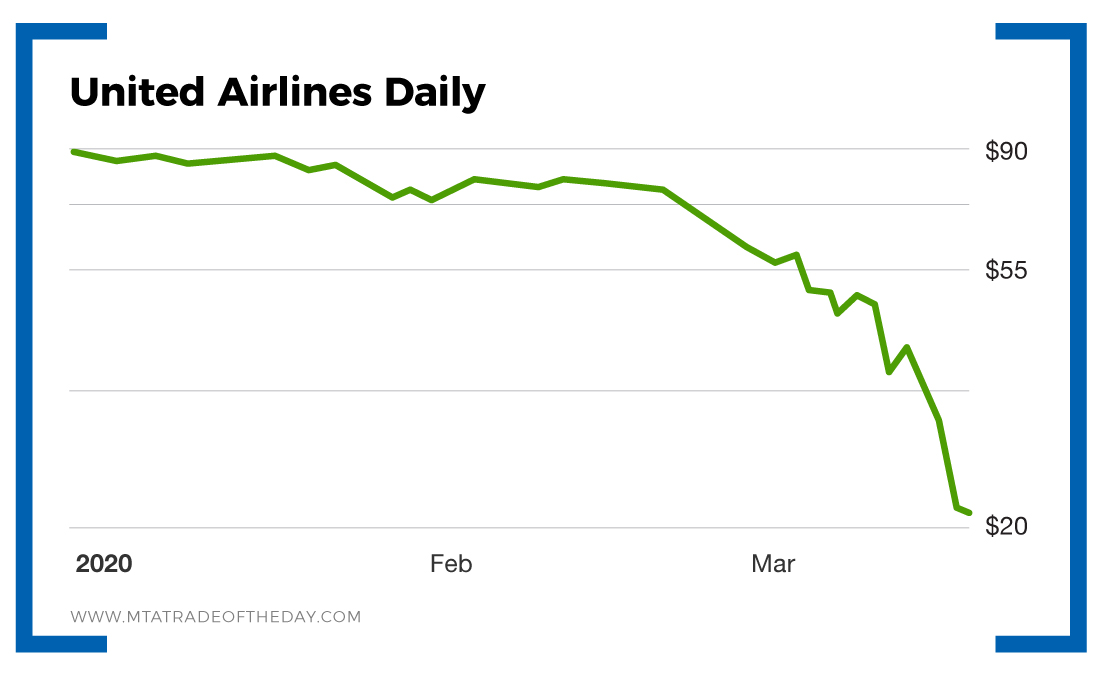Never Be “the Mush” – the Case for Not Bailing Out Any Airlines
I’d like to share with you a little casino trick I like to do – and relate it to the current status of the airline sector.
You see, whenever I’m at a craps table, I look for what I call “the mush.”
That’s the guy who will get the dice, roll once or twice and then immediately lose all his chips – only to come back five minutes later with more chips… and then do exactly the same thing.
Over and over again…
So when you find the mush, you structure your bets that allow you to profit when the mush loses. In craps-talk, you bet on the “don’t come” line whenever the mush is rolling. And when the mush eventually “craps out,” you profit.
After all, the name of the game is making money. Nothing more.
As I look at the airline sector right now, it sure looks to me like it is the mush.
You see, when it comes to the idea of an “airline bailout” – most likely funded by taxpayers like you and me – there have been some interesting discussions about why this is even needed, which I’d like to share with you.
As you may already know, U.S. airlines are seeking more than $50 billion in government aid.
However, do the airlines even deserve a bailout, considering what they’ve done with cash reserves?
You may not realize this, but the four biggest U.S. carriers – American, Delta, Southwest and United – have collectively spent about $39 billion over the last five years buying back shares.
But now airlines are burning through about $10 billion a month as cancellations “far outpace” new bookings.
Todd Insler, master executive council chairman of the Air Line Pilots Association (ALPA), said about United…
We fully recognize that the company had the opportunity to build up its cash reserves and repeatedly advocated for them to do so. In spite of ALPA’s warnings, they instead chose to spend company resources differently.
In other words, for the past five years – airlines could’ve built up a cash reserve to protect themselves from the situation we’re seeing today. But instead, the airlines got greedy – and bought back their shares. They wanted to make even more money – safety net be damned.
And now that the airline sector is in trouble, airline stocks are cratering.
Just look at United Airlines (Nasdaq: UAL) below…

It’s funny because financially disciplined U.S. families are advised to have at least six months of cash reserves on hand in case something unforeseen happens…
Like a layoff, a medical expense or even braces for your triplets.
And then there are the airlines that have thrown caution to the wind – and mindlessly bought back their own stock for years – all in the name of greed. And now, the second something goes wrong, they come begging for a bailout.
Action Plan: If the airlines do end up getting bailed out, I still don’t think they’re buyable.
In fact, in this case, they’re the mush that I described above. There is talk that if they do receive governmental assistance, it will come with an understanding that they must eliminate stock buybacks or share repurchases.
If that becomes the case, then any recovery bounce would most likely be temporary. So for now, the idea of “buying low” on the airlines is something to avoid.
P.S. When you enter The War Room, you’re never the mush. You’re the guy selling to the mush.
In the spirit of “thinking like a trader,” this is how I attempt to always be one to two steps ahead of the masses. And in doing so, War Room members are never the ones left holding the bag.
About Bryan Bottarelli
Whether it was selling the Star Wars figures he collected as a little boy for 50 times their value or using the $125 he made cutting grass to buy a Michael Jordan rookie card that he later sold for $1,500, it was always clear that Bryan Bottarelli was a born trader – possessing the unique ability to identify opportunities and leverage his investments.
Graduating with a business degree from the highly rated Indiana University Kelley School of Business, Bryan got his first job out of college trading stock options on the floor of the Chicago Board Options Exchange (CBOE). There, he was mentored by one of the country’s top floor traders during the heart of the technology boom from 1999 to 2000 – trading in the crowded and lively Apple computer pit. Executing his trades in real time, Bryan learned to identify and implement some of his most powerful trading secrets… secrets that rarely find their way outside the CBOE to be used by individual traders.
Recognizing the true value of these methods, Bryan tapped into his entrepreneurial spirit and took a risk. He walked off the CBOE floor and launched his own independent trading research service called Bottarelli Research. From February 2006 to December 2018, Bryan gave his precise trading instructions to a small, elite group – most of whom have been followers ever since.
As a “play tactician,” Bryan uses his hands-on knowledge of floor trading to shape opportunities and chart formations into elegant, powerful and profitable recommendations. And by using the same hedging techniques taught by professional floor traders, Bryan is able to deliver his readers remarkable gain opportunities while strictly limiting their total risk.
Along the way, Bryan has developed a cumulative track record that could impress even the most successful hedge fund manager.
He now spends his days moderating one of the most elite trading research forums ever created: The War Room.






